PUBLICATION
A Guide to Win Democracy Back: Civic Tech Project and Community Handbook
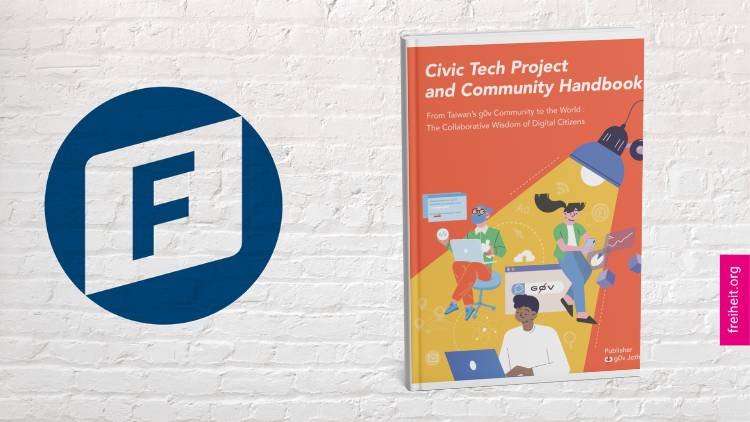
As a citizen, have you recently felt powerless to influence the decision-making process of public policy or to make a change in society? Do you find it more difficult to shape the development of technology than engineers or big tech companies do?
Civic Tech Project & Community Handbook—From Taiwan’s g0v Community to the World: The Collaborative Wisdom of Digital Citizens is here to help you to regain your strength as an active citizen.
The Handbook, co-developed by g0v Jothon, us, and many other contributors, aims to empower citizens to harness digital technologies to reclaim their active role in public participation and finding solutions to common problems. This handbook demonstrates how to make it happen with the best practices from around the world and hands-on training materials.
Let’s Begin with the Best Practices of Digital Democracy: g0v from Taiwan
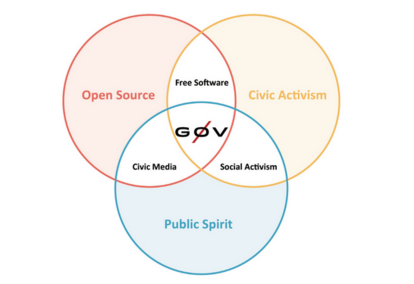
The elements of g0v. Retrieved from p.8 of Civic Tech Project & Community Handbook—From Taiwan’s g0v Community to the World: The Collaborative Wisdom of Digital Citizens
© CC BY-NC (c) g0v jothon & Contributors.What gave birth to this handbook? It is all thanks to g0v, one of the top three civic tech communities in the world. Since its founding in 2012, the community has nurtured numerous inspiring civic tech projects for democracy, human rights, environmental protection, and social resilience. As such, it is considered one of the most important forces for Taiwan’s digital democracy and a potential model for the world in combating digital authoritarianism.
“Don’t ask why ‘nobody’ is doing this. You are that 'nobody.' Because 'nobody' can do 'anything.'"
This is g0v’s community motto, which clearly explains their approach to bringing about change. The community encourages every citizen, particularly those without technological expertise, to join and initiate actions fearlessly. They don't have to do it alone. G0v brings together coders, programmers, engineers, advocates, and citizens from a variety of backgrounds to collaborate by sharing their expertise. Rather than encouraging one-click ultimate technology solutions and technologist-dominated culture, the community promotes decentralized, fair, open-source, interdisciplinary collaborations and human-centered approaches to create solution.
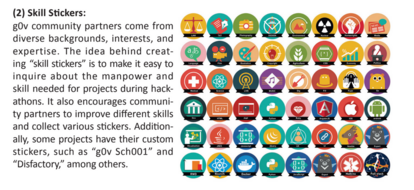
Stickers made by g0v members for participants to show what expertise they can contribute. Retrieved from p.39 of Civic Tech Project & Community Handbook—From Taiwan’s g0v Community to the World: The Collaborative Wisdom of Digital Citizens
© CC BY-NC (c) g0v jothon & Contributors.Such a precious experience should be preserved and transferred as useful resources for every citizen—that’s how some members of the community have considered, so g0v jothon, one of the task forces of the community, has started writing the Handbook since 2024.
Experiences of Digital Democracy and Civic Tech from around the World
The Handbook aims to become a practical and useful resource for the global civic tech community and citizens, so it collects cases and experiences not only from Taiwan but also from Korea, Thailand, Japan, Germany, and many other countries. Examples include the Map of Gazettes, initiated by Code for Korea to enhance the digitization of government data; Cofact.org, a participatory fact-checking platform initiated by members of Thai civil society; and the Kakogawa City Civic Participation Decision-Making Platform, co-developed by Kakogawa City Hall and Code for Japan. The Open Knowledge Foundation Deutschland is also featured as an important accelerator of many civic tech projects for digital democracy. More examples can be found in the handbook.
Guides and Hands-on Exercise Sheets for Everyone to Initiate a Project or a Community
Having one great project is encouraging, but it may be not enough to create a tremendous impact. To inspire more, we need a community. With more than 13 years of experience, the g0v members understand this well, so the Handbook also provides step-by-step instructions on both how to start a project and develop a civic tech community.
Drawing from the collective wisdom of g0v members and other civic tech communities worldwide over the past 13 years, the guide was developed as a workflow that enables citizens without a technology background to collaborate with coders, engineers, and programmers. This tackles the pain point that citizens encounter when they want to initiate a project: they often feel inexperienced when it comes to technology and unsure how to communicate with technologists. Even if they want to, they don’t know how and where to start.
Rather than adopting a technology-centered logic, the Handbook clearly states that the focus of initiating a project should be on solving problems through human-centric solutions and collaboration. This includes identifying problems, the target audience, existing solutions, solution planning and implementation, and necessary talent recruitment.
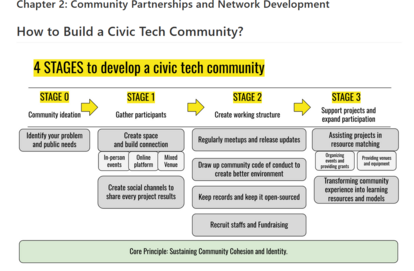
The four stages to develop a civic tech community. Retrieved from p.22 of Civic Tech Project & Community Handbook—From Taiwan’s g0v Community to the World: The Collaborative Wisdom of Digital Citizens
© CC BY-NC (c) g0v jothon & Contributors.It then identifies key technology project requirements to help citizens communicate with technologists. This way, citizens won't feel lost or overwhelmed when deciding which technology elements they need for their projects. These requirements includes which digital platforms the project team should use for communication and data storage, where the data sources are located, where to obtain licenses of these data, which existing technology resources can be used, and which code release licenses should be adopted once the programs are finished.
Enabling citizens with and without technology expertise to collaborate together for democracy, instead of asking a citizen to learn difficult technology or count on a genius to invent a technology solution, is the receipt of success of g0v community. It is also the core of its guide on how to build up a civic tech community.
In addition to breaking down the "how-to" into doable steps, the handbook also offers indicators to help participants evaluate their potential for establishing an ideal community in their countries. These indicators include the degree of open data in the public and private sectors, activeness of civil society, and public-private collaboration. This shows us that to have a successful civic tech community and project, democracy still serves as a critical foundation.
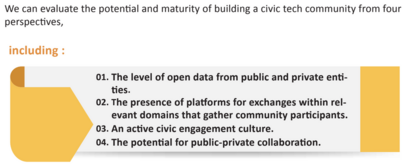
Elements for evaluate the potential and maturity to build up a civic tech community. Retrieved from p.41 of Civic Tech Project & Community Handbook—From Taiwan’s g0v Community to the World: The Collaborative Wisdom of Digital Citizens
© CC BY-NC (c) g0v jothon & Contributors.You can download the exercise sheet by clicking here.
How Does It Contribute to Digital Literacy and Innovation Education?
This successful model of innovation for democracy could inspire the next generation and invigorate the civic tech community, but some members of g0v also consider that it’s equally important to cultivate the next generation’s digital literacy and understanding of privacy protection, freedom of speech, human rights, and democracy so that their innovations are ethical and responsible.
This is why the topic of the handbook's chapter 5 is The Digital Citizenship Literacy Framework and Relevant Practices Across the World. The framework identifies key topics regarding human rights, freedom, privacy, media literacy, and democracy that students need to know before using digital technology. It also specifies what digital abilities that the next generation should develop and recommends educators what courses should be offered.
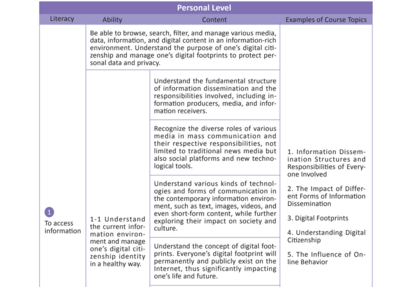
The Framework of Digital Literacy established by g0vsch001, Taiwan Pang Phuan Association, Cofacts, IORG, and many contributors. Retrieved from p.41 of Civic Tech Project & Community Handbook—From Taiwan’s g0v Community to the World: The Collaborative Wisdom of Digital Citizens
© CC BY-NC (c) g0v jothon & Contributors.The idea of developing this framework and content for digital citizenship education originates from g0v sch001—a digital literacy school without wall. Founded by some members of g0v, this school compiles and transforms knowledge and experiences into serial courses where young people can learn and apply technologies such as non-fungible token (NFT) blockchain, decentralized autonomous organization (DAO), large language model (LLM) , and artificial intelligence (AI). After completing the courses, students are invited to form and present their proposals at a competition. The school offers resources and mentorship to cultivate inspiring projects and hosts public events to showcase them and connect participants with the g0v community. Students and teachers can even collaborate on projects together. This way, digital citizenship education is no longer provided through a top-down approach. It can be initiated by young people or co-created by them and teachers.
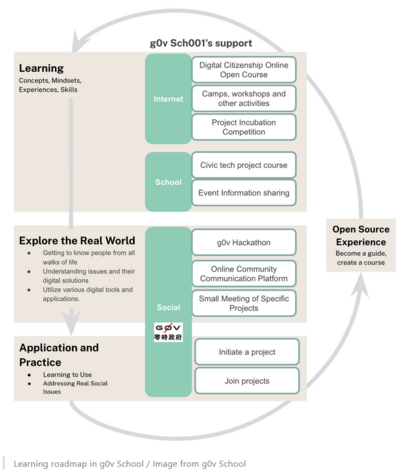
Image made by g0v Sch001, which is cited in p.133 of Civic Tech Project & Community Handbook—From Taiwan’s g0v Community to the World: The Collaborative Wisdom of Digital Citizens
© CC-BY 4.0 The mechanism of g0v sch001.In addition to offering a digital literacy framework and showcase how to create a learning environment, the handbook also highlights successful projects initiated by young people in Taiwan and from around the globe.
Read and Use Civic Tech Project & Community Handbook !
We hope you read and use this handbook. You can read the online version or download the PDF files. It would be great if you could also download the exercise sheet to lead a workshop, no matter it's with 5-6 people or a community of 30. This is how knowledge and the spirit of citizen activism in this Handbook can stay alive and evolve. We look forward to seeing it and hearing your feedback!
